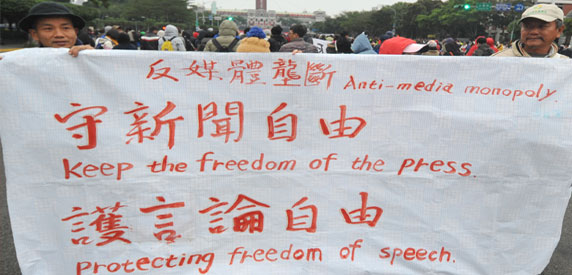Beijing maintains control of information on the mainland through a regime of official censorship reinforced by strong incentives for media organizations to self-censor. Over the past year, the central government has taken great lengths to tighten this control through campaigns to gain sway on social media, efforts to penalize foreign journalists and outlets for reporting sensitive stories, and detentions and new training requirements for domestic journalists to strengthen their party loyalty and encourage a “Marxist view of Journalism.” A recent report from the Committee to Protect Journalists looks at how Beijing’s influence is increasingly encouraging self-censorship in Hong Kong and Taiwan, and beginning to alter their relatively free media environments:
“Self-censorship–it’s like the plague, a cancerous growth, multiplying on a daily basis,” former journalist and current Hong Kong legislator Claudia Mo said. “In Hong Kong, media organizations are mostly owned by tycoons with business interests in China. They don’t want to lose advertising revenue from Chinese companies and they don’t want to anger the central government.”
[…] Meanwhile, in Taiwan, many media owners have close business ties to Beijing, which they are loath to jeopardize by drawing disfavor on the mainland. The Taiwanese press is also vulnerable to financial intervention in the form of advertising by Chinese interests–including some ads disguised as news, journalists say.
The state of media freedom in Hong Kong and Taiwan is significant in part because news outlets in both places have in the past provided comprehensive, independent coverage of China, filling a gap left by the tightly restricted mainland press. Any rise in interference, including self-censorship, would imperil the ability of the Hong Kong and Taiwanese press to play a watchdog role. […] [Source]
Click through to read all of the detailed analysis, and also see CPJ’s Chinese-language version.
Inhabiting the very bottom ranks of the World Press Freedom Index since Reporters Without Borders first published it in 2002, China fell from 173 to 175 (out of 180) in the recently released 2014 edition (a fact that became forbidden from mainland media discussion just after the report’s publication). RWB’s Asia-Pacific analysis also notes China’s increasing influence over the media in Taiwan and Hong Kong:
Chinese threat
China’s growing economic weight is allowing it to extend its influence over the media in Hong Kong, Macau and Taiwan, which had been largely spared political censorship until recently. Media independence is now in jeopardy in these three territories, which are either “special administrative regions” or claimed by Beijing. The Chinese Communist Party’s growing subjugation of the Hong Kong executive and its pressure on the Hong Kong media through its “Liaison Office” is increasingly compromising media pluralism there. It has also been threatened in Taiwan by the pro-Beijing Want Want group’s acquisition of the China Times. [Source]
In a blogpost summarizing both of the above reports, The New York Times’ Austin Ramzy provides an additional example of Hong Kong’s changing media landscape:
Hong Kong residents’ worries about media self-censorship appeared likely to deepen after the privately-owned Commercial Radio Hong Kong announced on Wednesday that it would no longer employ Lee Wei-ling, a popular host with a reputation for combative criticisms of the territory’s government.
The radio station gave no explanation for Ms. Lee’s removal in a terse statement that was quoted by other Hong Kong media, including the Web site of the Ming Pao newspaper. But her supporters accused the station bowing to political pressures, and colleagues called for a candle-light vigil to protest what they called a blow to free speech. Late last year, the station already moved Ms. Lee from her morning show to a less listened-to evening spot, and critics said then that Commercial Radio Hong Kong was seeking to mute her influence. [Source]
For a detailed explanation of how Beijing exerts its control over the domestic and foreign media through official mandate and by incentivizing self-censorship, see the Council on Foreign Relations’ recently updated backgrounder “Media Censorship in China”. Also see the Nieman Foundation’s recent report “The State of Journalism in China.”








